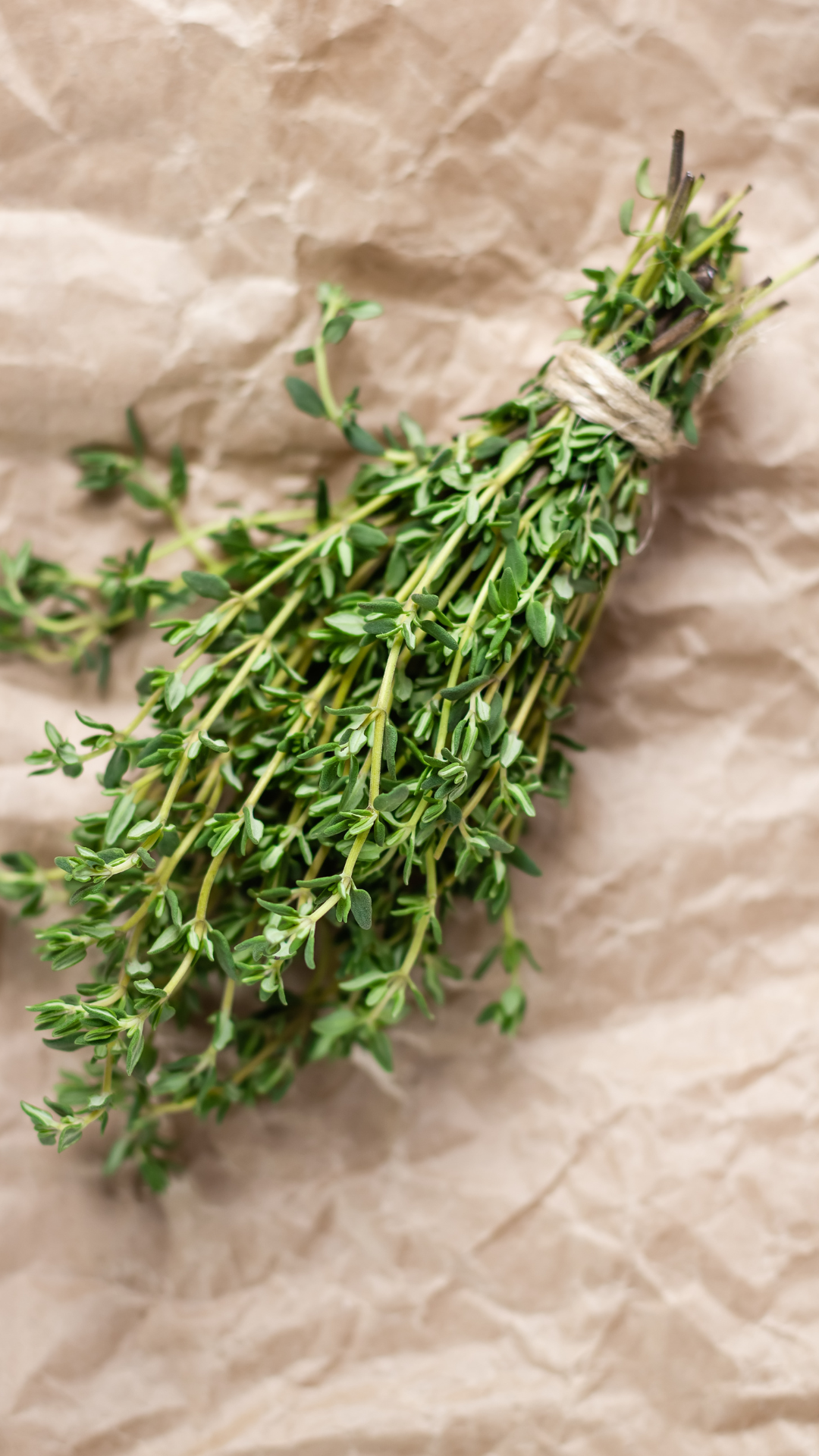Thyme
Growing up in a Jamaican household, I was exposed to thyme from ever since I can remember. Jamaicans use thyme in EVERYTHING. It has a wonderful aroma and together with garlic and scotch bonnet pepper, is a staple in Jamaican cuisine.
If I ever had to make a list of only 7 herbs to have on a desert island, thyme would most probably be one of them. It has a wide range of uses and is just so beneficial for the whole family - no home should be without thyme!
Thyme oil is used as an ingredient in things like cosmetics, toothpaste, soaps and aromatherapy.
Thyme is native to the Mediterranean but can be grown very easily in your garden, given it's in a bright sunny spot. If you grow your own you also have the benefit of picking and using it any time you like - fresh thyme tea is the best!
Common Name: Thyme
Botanical Name: Thymus vulgaris
Family: Lamiaceae (mint family)
Parts used: Leaves + flowering tops
Description
Thyme is a cousin of mint and like mint has a very strong aroma. This is due to the abundance of essential oil contained in thyme (particularly thymol and carvacrol which have been studied the most). This oil isn't just there to smell nice, but many of the therapeutic benefits of thyme come from the action of the essential oil.
Thyme is highly antimicrobial and has traditionally been used in many remedies for infections. It is particularly antiseptic to the gastrointestinal and respiratory tracts, meaning it's good to use in the case of any gut or respiratory infections.
It's uses for the gut are endless. It has what we herbalist call anthelmintic action, meaning it helps to kill or expel intestinal worms/parasites. Thyme has bitter properties which make it a useful digestive tonic. It's also a carminative which means you can use it when suffering from bloating and excess wind. Lastly it helps to relax the muscles of the gut so can relieve spasms.
The second system that thyme has a special affinity for is the respiratory system - it is one of the key herbs in this space. Thyme is commonly used in cough and cold remedies because it has the ability to soothe cough and fight the infection that has usually caused it. It is often used in syrups, along with other herbs such as liquorice. It's also anti-inflammatory so will help to reduce the inflammation in the airways too.
Thyme boasts potent anti-spasmodic (reduces spasms of the airways) and expectorant (helps remove excess mucus from airways) action, so it's perfect in cases of asthma and bronchitis, where there is usually constriction of the airways and lots of thick mucus. The constituents in thyme help to break up and loosen the mucus, which makes it easier to expel.
Thyme can also be used as a chest rub (dilute thyme oil in olive oil in a ratio of about 1:50 or 2%) in chesty coughs and chest infections. I like rubbing it into my chest just after a hot shower, before I hop into bed. The oil can be used for steam inhalations too and pairs well with an oil like eucalyptus.
Traditionally the oil was used topically for fungal or bacterial skin infections, of which it is very effective.
Note: The actions explained above come from using thyme as a whole plant and not just the oil alone. Thyme oil should NOT be used internally, unless under treatment from an experienced qualified practitioner.
Main constituents
Essential oil (containing phenols thymol + carvacrol), tannine, triterpenes, polysaccharides and polymethoxyflavones
Actions
Indications
*Indications simply mean what conditions this herb is typically used for
Dyspepsia, indigestion, infections of the digestive and respiratory tracts, bronchitis, chest infections, coughs, cold/flu, asthma, sore throats and tonsillitis.
How to use it
Infusion: Make an infusion from dried or fresh thyme leaves and drink 3 cups a day. Note that if you are using fresh thyme (which is amazing stuff by the way) that you'll need to use much more than when using dried. Remember to cover it whilst it brews too - trap all of those wonderful therapeutic essential oils in!
Tincture: Take 20-40 drops of tincture three times a day for suitable conditions.
Culinary: Try growing some fresh thyme on your window or in your garden - add it to all of your dishes or try making a thyme + honey dressing for your salads.
Dosage
20-40mls per/week (tincture)
Safety considerations
Make sure to always dilute thyme essential oil when using on your skin. You can use a base oil such as olive oil and start with a 1:50 ratio of thyme to olive oil.
Reading Material
Principles and Practice of Phytotherapy by Mills and Bone
Medical Herbalism by David Hoffman
The Complete Herbal Tutor by Anne McIntyre
When using this blog, any link you click may result in an affiliate payment to me, I earn a commission from qualifying purchases, at no extra cost to you.



